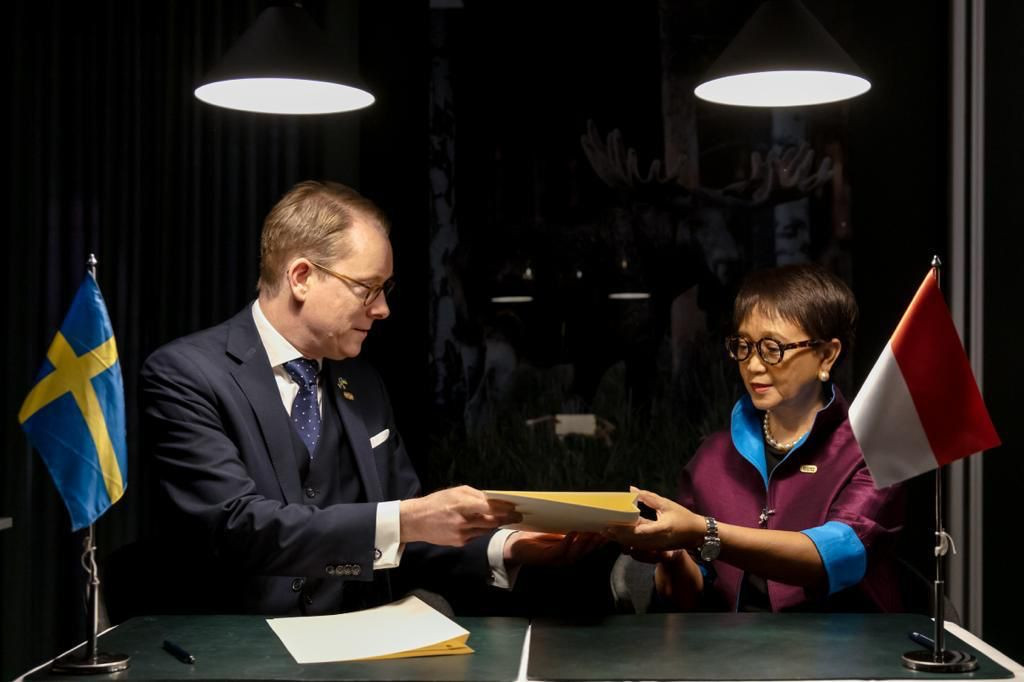Popular Reads
Top Results
Can't find what you're looking for?
View all search resultsPopular Reads
Top Results
Can't find what you're looking for?
View all search resultsWhy Sweden’s accession to the ASEAN TAC matters
Sweden has had long historic and productive relations with the region; thus, acceding to the Treaty of Amity and Cooperation (TAC) will only strengthen the former’s standing with ASEAN.
Change text size
Gift Premium Articles
to Anyone
O
n a sunny Nordic weekend, 60 delegations from 60 countries converged in the second European Union Indo-Pacific Foreign Ministers Forum hosted by Sweden on May 13. Swedish Foreign Minister Tobias Billström co-chaired the forum as the current president of the EU together with EU’s foreign policy chief Josep Borrell.
The forum took place at a tumultuous period in global affairs where geopolitical and economic rivalries are on the rise, concocted by an almost perpetual conflict in Ukraine in which the international community has yet to see some light at the end of the tunnel.
Foreign Minister Retno LP Marsudi, representing ASEAN chair Indonesia, was invited to the gathering as a special guest to deliver a keynote address in which she highlighted ASEAN’s unified reluctance to see an Indo-Pacific region evolve into yet another theater of rivalry and wars, as is the case in other regions.
Another salient point featured in her address was the dire need for “collaboration” to achieve “concrete” deliverables of mutual interest to the EU and ASEAN within the Indo-Pacific realm.
Be that as it may, how does one, or two, even begin to realize these goals and aspirations amidst potential arch-rivalry looming over the Indo-Pacific region?
One good deed that may potentially kick-start a fine yet concrete collaboration was a modest handing-over ceremony from Minister Billström to Minister Retno of Sweden’s formal intention to accede to the Treaty of Amity and Cooperation (TAC) in Southeast Asia at the margin of the EU Indo-Pacific Forum.
The TAC in Southeast Asia sets out the legally binding code for inter-state relations in the region toward the envisioned peaceful coexistence and friendly cooperation, which underlines the dynamics of the region. By signing this treaty, countries show their commitment to maintaining peaceful relations and building strong partnerships. It helps create a sense of trust and stability among nations, making the world a safer and more cooperative place to live.
Sweden's intention to accede to the TAC, to join the ranks of 51 other contracting parties, including seven other EU member states, is based on several merits.
First, it demonstrates Sweden’s confidence in ASEAN as a region of peace, stability and prosperity. This Nordic country has had long historic and productive relations with the region; thus, acceding to the TAC will only strengthen the former’s standing with ASEAN.
Second, the move is also strategic should Sweden intend to contribute to maintaining peace and stability in Southeast Asia and the Indo-Pacific region based on international law. It would provide opportunities to address common challenges, exchange views on regional issues and contribute to discussions on peace, security, and stability in Southeast Asia. Sweden's involvement in ASEAN platforms could also help shape regional policies and initiatives.
Third, Sweden has an immediate geo-economic interest to deepen and widen its relations with ASEAN through its approximately 700 private companies, and growing, based in the region according to Business Sweden. Approximately 80 companies are present in Indonesia, including Ericsson, which has been active in Indonesia as early as 1907.
Moreover, the region is also a popular tourist destination for Swedish families, attracting about 470,000 visitors annually and 50,000 visiting Indonesia during the pre-pandemic period.
Fourth, Sweden’s accession to the treaty provides ample opportunities for the country to benefit from the stable economic growth in the region, one in which the former may be able to partner in green transition, sustainability, renewable energy and digital transformation. As a country globally known for its innovation, Sweden certainly has a quality that ASEAN desperately needs. What a perfect match.
Lastly, a solid Swedish foothold on ASEAN has a far-reaching yet beneficial impact on the country. By joining the treaty, Sweden could engage in cultural, educational and social exchanges, promoting mutual understanding, cultural diversity and closer ties between Sweden and the ASEAN region.
It can anchor Sweden’s engagement in Asia-Pacific or Indo-Pacific, which are predicted to experience exponential economic growth in the coming years. It would allow Sweden to contribute to regional efforts in addressing common challenges such as climate change, sustainable development, commerce, security issues and disaster management.
The path will be open for collaboration with ASEAN member states on various regional agendas and initiatives, fostering shared understanding and cooperation on pressing issues. ASEAN centrality matters.
Minister Retno rightfully pointed out the urgency to adopt “concrete collaboration” as a rule of the game in the Indo-Pacific. But how can this be done simultaneously by more than 60 countries situated in this vast and complex region?
Perhaps both Indonesia and Sweden can work together to set the stage. For Sweden, it starts with acceding to the TAC.
***
The writer is Indonesian ambassador to Sweden.










